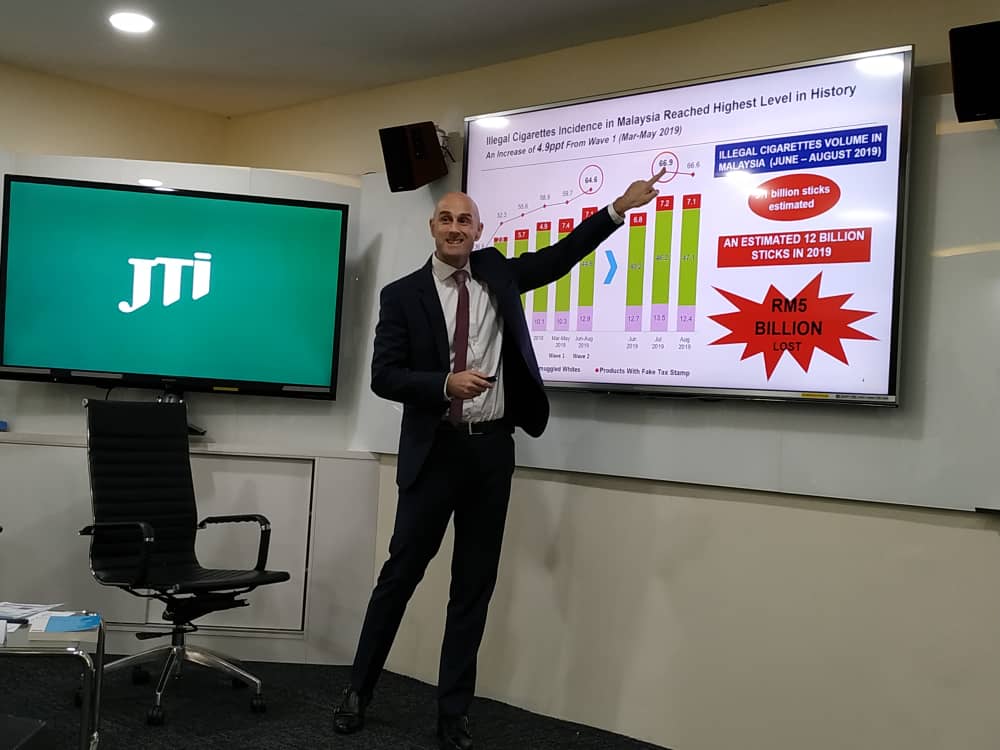KUALA LUMPUR, Nov 5 — Malaysia’s illicit cigarette incidence has increased to about 65 per cent as of last August, the highest in the world, a tobacco manufacturers’ study showed.
According to the Illicit Cigarettes Study (ICS) commissioned by the Confederation of Malaysian Tobacco Manufacturers (CMTM), 64.6 per cent of cigarettes consumed in Malaysia between June and August this year were illegal, rising by 5 percentage points from 59.7 per cent recorded in the previous study conducted between last March and May.
“Malaysia’s illicit cigarettes trade is the largest throughout the world,” JTI Malaysia managing director Cormac O’Rourke told the press here today when presenting the study, adding that this was supported by Euromonitor International’s “Key findings in global tobacco” June 2019 research.
He said the illegal cigarettes volume in Malaysia was estimated at 3.1 billion sticks between last June and August, with a projected 12 billion illicit sticks in 2019 that will lead to an estimated RM5 billion loss of tax revenue.
Malaysia’s illegal cigarette trade has steadily risen from about 37 per cent in 2015, when the tobacco industry was hit with a 36 per cent excise duty hike in November 2015, to 65 per cent in June to August 2019.
Selangor and Kuala Lumpur recorded the highest number of illicit cigarettes between June and August this year at 922 million and 432 million respectively, marking over two-thirds at 67 per cent and 66 per cent respectively.
JTI Malaysia slammed the Health Ministry for proposing to amend the Control of Tobacco Products Regulations 2004 to raise the minimum cigarette price by 50 per cent from RM10 to RM15, even though illicit cigarettes are sold at between RM3 and RM7.
“This is an attack on legitimate retailers and legitimate consumers,” O’Rourke said.
“We call on the government not to increase the minimum cigarette price as it serves no public health agenda and it’ll only fuel the illegal cigarettes trading further.”
JTI Malaysia managing director Cormac O’Rourke
JTI Malaysia also called for a further excise tax moratorium for the next two years to prevent smokers from switching to illegal sticks, noting that RM9 per pack of cigarettes goes to the government. JTI’s cheapest product in Malaysia, LD, is priced at RM11.90.
Malaysia’s second largest tobacco company further demanded a ban on transshipment for cigarettes at entry points into Malaysia, as illegal cigarettes are smuggled into the country, not produced here.
“There should also only be a single point of entry for any importation of cigarettes into Malaysia,” said O’Rourke.
He proposed an independent body to address illegal cigarette sales, comprising the police, Customs Department, the Finance Ministry, the Health Ministry, as well as possibly the Malaysian Anti-Corruption Commission.
Malaysia’s tobacco market, he said, is dominated by illegal cigarettes at 65 per cent, with e-cigarette and vaping products comprising 10 per cent, leaving the legal tobacco industry with a quarter of the market at 25 per cent. Malaysia is expected to lose RM6 billion in tax revenue annually from both illegal cigarettes and vaping products.
“The industry is now at breaking point.”
JTI Malaysia managing director Cormac O’Rourke
“The investments the industry makes with retailers is affected. You’ll see an impact on investments into Malaysia,” said O’Rourke.
JTI Malaysia employs over 350 staff and works with more than 47,000 retailers nationwide through its appointed distributors.
O’Rourke also accused the Health Ministry of not taking action on e-cigarettes and vaping shops, including online sales of the products, as vaping remains unregulated in Malaysia.
“There seems to be wilful confusion by the Ministry of Health,” he said. “There is no consultation with the tobacco industry on the drafting of new laws on vape or tobacco control.”
O’Rourke called for a regulatory framework on e-cigarettes and vaping products to ensure standards and quality products, pointing to the UK and New Zealand.
He added that any taxes on what he dubbed as “reduced risk products” should be lower than on traditional cigarettes if the government believed that e-cigarettes or vaping could reduce harm. Vaping products in many countries are not taxed, while taxes on heated tobacco products are generally less than traditional cigarettes in several economies.
CMTM’s illegal cigarette study collected 51,000 empty packs nationwide to determine the incidence of illicit cigarettes in Malaysia.
O’Rourke said the Health Ministry has yet to produce its own numbers on the trend, despite regularly dismissing such studies by the tobacco industry.








